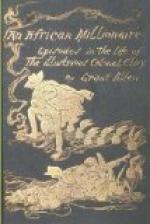The guests that evening were no more than seven, all told, ourselves included—making up, Wrengold said, that perfect number, an octave. He was a nouveau riche himself—the newest of the new—commonly known in exclusive old-fashioned New York society as the Gilded Squatter; for he “struck his reef” no more than ten years ago; and he was therefore doubly anxious, after the American style, to be “just dizzy with culture.” In his capacity of Mæcenas, he had invited amongst others the latest of English literary arrivals in New York—Mr. Algernon Coleyard, the famous poet, and leader of the Briar-rose school of West-country fiction.
“You know him in London, of course?” he observed to Charles, with a smile, as we waited dinner for our guests.
“No,” Charles answered stolidly. “I have not had that honour. We move, you see, in different circles.”
I observed by a curious shade which passed over Senator Wrengold’s face that he quite misapprehended my brother-in-law’s meaning. Charles wished to convey, of course, that Mr. Coleyard belonged to a mere literary and Bohemian set in London, while he himself moved on a more exalted plane of peers and politicians. But the Senator, better accustomed to the new-rich point of view, understood Charles to mean that he had not the entrée of that distinguished coterie in which Mr. Coleyard posed as a shining luminary. Which naturally made him rate even higher than before his literary acquisition.
At two minutes past the hour the poet entered. Even if we had not been already familiar with his portrait at all ages in The Strand Magazine, we should have recognised him at once for a genuine bard by his impassioned eyes, his delicate mouth, the artistic twirl of one gray lock upon his expansive brow, the grizzled moustache that gave point and force to the genial smile, and the two white rows of perfect teeth behind it. Most of our fellow-guests had met Coleyard before at a reception given by the Lotus Club that afternoon, for the bard had reached New York but the previous evening; so Charles and I were the only visitors who remained to be introduced to him. The lion of the hour was attired in ordinary evening dress, with no foppery of any kind, but he wore in his buttonhole a dainty blue flower whose name I do not know; and as he bowed distantly to Charles, whom he surveyed through his eyeglass, the gleam of a big diamond in the middle of his shirt-front betrayed the fact that the Briar-rose school, as it was called (from his famous epic), had at least succeeded in making money out of poetry. He explained to us a little later, in fact, that he was over in New York to look after his royalties. “The beggars,” he said, “only gave me eight hundred pounds on my last volume. I couldn’t stand that, you know; for a modern bard, moving with the age, can only sing when duly wound up; so I’ve run across to investigate. Put a penny in the slot, don’t you see, and the poet will pipe for you.”




